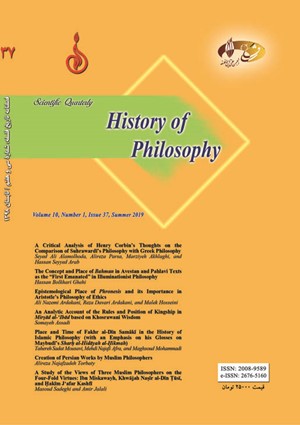The Concept and Place of Bahman in Avestan and Pahlavi Texts as the “First Emanated” in Illuminationist Philosophy
Subject Areas : Connection of philosophers’ views and philosophical schools with the social and philosophical conditions of the time
1 - Tehran University
Keywords: ancient Iranian wisdom Illuminationist philosophy Suhrawardī intellect Bahman first-emanated,
Abstract :
The statement, “Reason was the first thing that God created”, which has been mentioned in several Islamic texts and has been quoted and emphasized by some great philosophers such as Suhrawardī and Mullā Ṣadrā (in Sharḥ-i uṣūl al-kāfī), is a well-known narration in Islamic ḥadīths. A similar statement with a clearer meaning is: “The Glorious God created the intellect, which was the first heavenly created”. Such statements gain more significance when we compare them with similar statements regarding the place of the intellect, which is equal to being, in Greek philosophy. As the master of all Iluminationist philosophers, Suhrawardī, as he has emphasized in his treatise of Fī ḥaqīqat al-‘ishq (On the Truth of Love) (p. 268), was well-aware of this famous narration. Given Suhrawardī’s explicit reference to this statement and his clear indication in Ḥikmat al-ishrāq, in which he calls himself the reviver of ancient Iranian philosophy (or at least introduces the wisdom of ancient Iranian philosophers (fahlavīūn) as one of the main sources of his own philosophy), this study aims to provide an answer to the question of how we can trace the effects of ancient Iranian wisdom in Suhrawardī’s philosophy. One of the most important factors linking his philosophy to ancient Iranian philosophy is his reference to the place of such Amesha Spenta as Bahman or Urdībihišt in Avestan and Pahlavi texts and considering them as the pillars of the nūrī (illuminative) and ontological system in his philosophy. Here, based on the principle of “Nothing is emanated from the one but one”, he calls the first-emanated from the light of lights (al-nūr al-anwār) the closest light (al-nūr al-aqrab) and, based on ancient Iranian philosophy, he calls it Bahman. However, one might inquire about the relationship between Bahman and the first-emanated, particularly if the first-emanated in Islamic philosophy is the intellect. Following a historical and analytic approach, this paper investigates the philosophy of choosing Bahman as the first-emanated in Suhrawardī’s philosophy and examines his particular choice of Bahman as the god of wisdom and knowledge as tantamount to the intellect in Islamic ḥadīths, which demonstrates Suhrawardī’s profound knowledge of ancient Iranian wisdom.
قرآن کریم. آموزگار، ژاله؛ تفضلی، احمد (1376) تاریخ ادبیات ایران پیش از اسلام، تهران: سخن.
آموزگار، ژاله؛ تفضلی، احمد (1386ب) اسطوره زندگی زردشت، تهران: چشمه.
آموزگار، ژاله؛ تفضلی، احمد (1386الف) کتاب پنجم دینکرد، تهران: معین.
بلخاری قهی، حسن (1392) فلسفه هنر اسلامی، تهران: علمی و فرهنگی.
پورداود، ابراهيم (1326) فرهنگ ایران باستان، پاکتچی.
پورداود، ابراهيم (1354) گاثاها، تهران: دانشگاه تهران.
پورداود، ابراهيم (1356الف) یادداشتهای گاتاها، بکوشش بهرام فرهوشی، تهران: دانشگاه تهران.
پورداود، ابراهيم (1356ب) یسنا، بکوشش بهرام فرهوشی، تهران: دانشگاه تهران.
دادگی، فرنبغ (1369) بندهش، بکوشش مهرداد بهار، تهران: توس.
دوستخواه، جلیل (1370) اوستا، گزارش و پژوهش، تهران: مروارید.
راشد محصل، محمدتقی (1385) زند بهمن یسن، تصحيح متن، آوانویسی، برگردان فارسی و یادداشتها، تهران: پژوهشگاه علوم انسانی و مطالعات فرهنگی.
راشد محصل، محمدتقی (1389) دینکرد هفتم، تهران: پژوهشگاه علوم انسانی و مطالعات فرهنگی.
رضی، هاشم (1367) فرهنگ اعلام اوستا، تهران: فروهر.
سهروردي، شهابالدين (1361) حکمةالاشراق، ترجمة سیدجعفر سجادی، تهران: دانشگاه تهران.
سهروردي، شهابالدين (1378) مجموعه مصنفات شیخاشراق، بکوشش سیدحسین نصر و هانری کربن، تهران: مؤسسه مطالعات و تحقیقات فرهنگی.
شهرستانی، محمد بن عبدالکریم (بیتا)، الملل و النحل، ترجمة ترکه اصفهانی، تهران: چاپخانه علمی.
فضیلت، فریدون (1384) کتاب سوم دینکرد، تهران: مهرآیین.
کلینی، محمد بن یعقوب (1379) اصول کافی، تهران: دفتر مطالعات تاريخ و معارف اسلامي.
كريستين سن، آرتور (1378) ایران در زمان ساسانیان، ترجمه رشید یاسمی، تهران: صدای معاصر.
نظری فارسانی، محسن (1397) دینکرد هشتم، تهران: فروهر.


